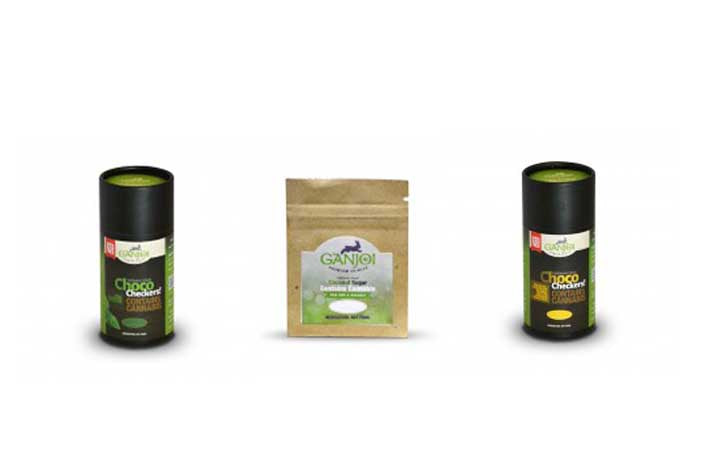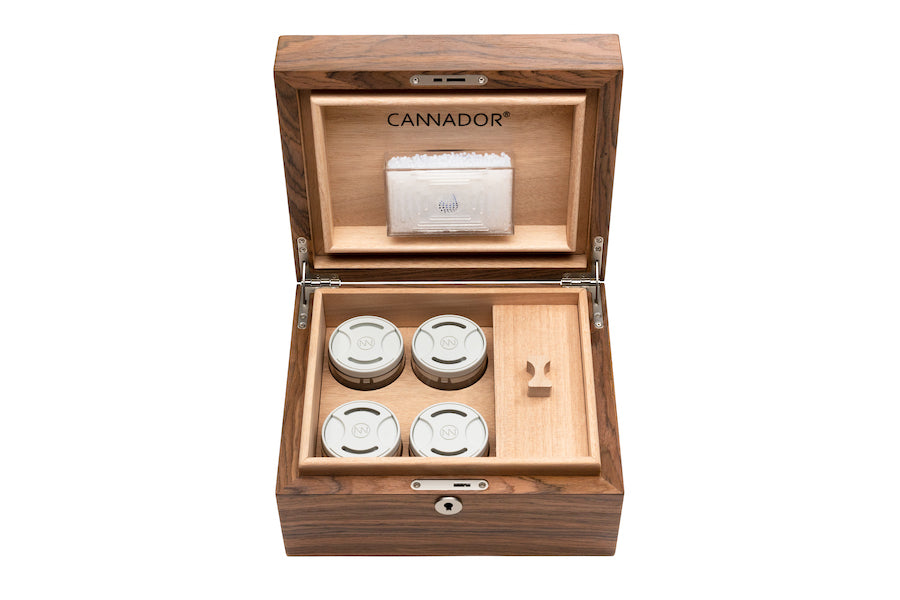There are many ways to consume cannabis and not all require a bong or a blow torch. Our favorite smoking alternative is pre-packaged edibles for one very important reason: dosage labeling. Cooking with cannabis butter and oil is fun too, but one of the intimidating factors is not knowing how much THC is in every bite. This is why pre-packaged edibles are a go-to when it comes to ingesting weed. However, there’s just one small problem with many pre-packaged edibles on the market…they’re loaded with sugar! There are a handful of companies that recognize people aren’t looking to get an additional sugar high, especially those who suffer from diabetes, but few stand out in this sugary sea. We met up with one such company, Ganjoi, owned and operated by Aaron Scheiner in Sacramento, California, that specializes in healthy cannabis edibles.
What’s unique about Gonjoi’s edibles is their approach to dietary concerns like glucose, gluten, and dairy. The edibles they make are vegan granola bites and chocolate covered checkers. Additionally, they offer infused white sugar that has been evaporated from cane juice and contains 19 mg of THC per teaspoon as well as an infused coconut sugar that contains the same dosage per teaspoon. Everything they offer is non-GMO, completely organic and contains no preservatives or additives. This is completely counter to what most dispensaries stock in their edibles section, so we had to learn more about why Aaron’s fighting the good fight.

Q: The first time I visited a California dispensary as a legal patient, I noticed that many refrigerators were full of infused brownies, cupcakes, fudge bars and candies. Some had labels, some didn’t. I used to eat junk-food like that when I was a kid, so I was really disappointed that I didn’t see one single healthy alternative stocked on any shelves in the Greater Los Angeles area. This was back in 2012, so I’m sure there’s more options available now, and this is also why your food products really caught my attention. Aside from the economics, is this an uphill battle for you or are you finding it an easy sell to dispensaries?
A: Dispensaries often have an easy time seeing the advantages of health-conscious products for their patients, so the uphill battle is connecting with the patients themselves. An illness that causes you to use cannabis as treatment typically also requires that you stay away from processed sugars, gluten, and sometimes dairy. Patients deserve to know that these options exist, which is why I like to get into dispensaries to meet and talk to patients and give out samples of our products. The disconnect between medicine makers and the patients is real but certainly not as bad as the pharmaceutical industry.
Q: It’s frustrating that healthy foods come at such a premium. It’s almost as if I have to constantly weigh my health against my bank account. Do I go with the $5/lb free-range chicken or the $1/lb mutant chicken that comes with the emotional baggage of knowing its lived a meager life in a contract warehouse? Are you seeing this same dichotomy within the cannabis industry?
A: Yes, as long as there are people willing to pay extra for a perceived value, this dichotomy will always exist. At Ganjoi, we price our edibles at or just above cost. We feel that there’s no reason sick people should be paying more for their medicine than necessary.
Q: Once legalization takes place in California, are you fearful that the regulations on edible producers will be too costly for small operations like yours? Have there been talks between legislators and businesses to help prepare people?
A: The simple answer is that cost will go up for us vendors so price will go up for patients, furthering the dichotomy we discussed before. There has been a battle between politicians and small businesses where legislators want to treat this industry like a for-profit business, squeezing dollars out of every process they regulate. While further regulations are necessary, the laws themselves need to allow affordable access to medication for patients.

Q: The FDA recently sent warning letters to eight companies selling CBD supplements citing that the information they posted on their website, like helping treat depression, heart disease and anxiety were false advertising. They’re primary concern is that it’s illegal for supplements to contain CBD, so this is different than edibles, but eventually we’re going to see more cases like this bubble to the surface. What are some of the things that edibles companies like yours are doing to not only protect consumers, but protect yourself from government agency crack-downs?
A: Protecting consumers is a tough job, especially when they’re willing to purchase something that is still federally illegal. Having accurate and clear dosage levels on labels one way we protect our patients. In terms of protecting ourselves as a producers, we have spoken to lawyers and are aware of the possibility of federal interference. We believe in cannabis as a medicine and we stand up for what is right. Fear will only hinder our progress as an industry.
Q: We spoke with the writer of the Cannabis Kitchen Cookbook, Robyn Lawrence, about learning your tolerance levels and in Colorado, The Council on Responsible Cannabis Regulation believes that 5 milligrams of THC is best for first-timers. Given that your granola bites contain 100 milligrams of THC, would it be safe to assume these aren’t for first-timers?
A: That is most definitely the case. It’s always important to start small. Although no amount of marijuana that is consumable will kill you, it can make you very paranoid, dizzy, or flat out asleep if you take more than you’re used to. I heard form a medical doctor that works very closely with children and adults explain that he starts with a 0.1mg dose for all patients. It can be as simple as arousing the endocannabinoid system to get the intended effects. This system is responsible for producing cannabinoids naturally within the body and may not be functioning properly in some people. If you think of THC as a vitamin, it’s easy to see why not having it would cause major problems for those incapable of producing their own. If a person is under-producing a given cannabinoid and not getting it in their diet, problems can develop. Some researchers believe one of the effects of not consuming cannabinoids (for those people with weak endocannabinoid systems) is the progression or development of some cancers. So, although 5mg may be the threshold for feeling stoned from the medication, much lower doses can be structured for treatment. This is why our medicated sugar is a great application for low dosing because one grain contains 0.25mg. It’s crucial to provide options for people, and at Ganjoi we create healthy options.
For more information about Ganjoi’s healthy smoking alternatives, check out: ganjoi.com



